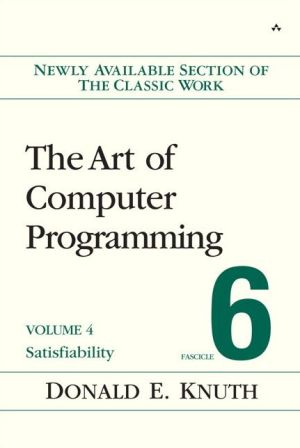Snippets
#The Art of Computer Programming, Volume 4, Fascicle 6: Satisfiability. Donald E. Knuth #####Publisher: Addison-Wesley

File name: The-Art-of-Computer.pdf
ISBN: 9780134397603 | 320 pages | 8 Mb
The Art of Computer Programming, Volume 4, Fascicle 6: Satisfiability Donald E. Knuth epub
In 1962 Donald Knuth sketched out chapter titles for a twelve chapter book on computer algorithms called "The Art of Computer Programming." Chapter 7 was to cover combinatorial algorithms, algorithms having to do with the arrangement of objects into patterns. As Knuth himself put it: "At that time I decided to include a brief chapter about combinatorial algorithms, just for fun. “Hey look, most people use computers to deal with numbers, but we can also write programs that deal with patterns.” In those days it was easy to give a fairly complete description of just about every combinatorial algorithm that was known. And even by 1966, when I’d finished a first draft of about 3000 handwritten pages for that already-overgrown book, fewer than 100 of those pages belonged to Chapter 7" (from the preface to volume 4A of TAOCP) Well, needless to say he underestimated the scope of the problems and the resources eventually devoted to working on them. This is the second fascicle in volume 4B.
The Art of Computer Programming, Volume 4, Fascicle 6 ...
Donald E. Knuth is known throughout the world for his pioneering work on algorithms and programming techniques, for his invention of the TEX and METAFONT systems for computer typesetting, and for his prolific and influential writing.Professor Emeritus of The Art of Computer Programming at Stanford University, he currently devotes full time to the completion of these fascicles and the seven
The Art of Computer Programming, Volume 4, Fascicle 0 ...
The Art of Computer Programming, Volume 4, Fascicle 0: Introduction to Combinatorial Algorithms and Boolean Functions [Donald E. Knuth] on Amazon.com. *FREE* shipping on qualifying offers. Art of Computer Programming, Volume 4, Fascicle 0
The Art of Computer Programming, Volume 4, Fascicle 6 ...
Volume 4 Fascicle 6 This fascicle, brimming with lively examples, forms the middle third of what will eventually become hardcover Volume 4B. It introduces and surveys "Satisfiability," one of the most fundamental problems in all of computer science: Given a Boolean function, can its variables be set to at least one pattern of 0s and 1s that will make the function true?
[S134.Ebook] PDF Ebook The Art of Computer Programming ...
PDF Ebook The Art of Computer Programming, Volume 4, Fascicle 6: Satisfiability, by Donald E. Knuth. Locate the secret to enhance the lifestyle by reading this The Art Of Computer Programming, Volume 4, Fascicle 6: Satisfiability, By Donald E. Knuth This is a type of publication that you require now. Besides, it can be your preferred publication to check out after having this publication The
The Art of Computer Programming: Satisfiability, Volume 4 ...
This multivolume work on the analysis of algorithms has long been recognized as the definitive description of classical computer science. The four volumes published to date already comprise a unique - Selection from The Art of Computer Programming: Satisfiability, Volume 4, Fascicle 6 [Book]
The Art of Computer Programming, Volume 4, Fascicle 6 ...
Buy the The Art of Computer Programming, Volume 4, Fascicle 6: Satisfiability ebook. This acclaimed book by Donald E Knuth is available at eBookMall.com in several formats for your eReader. Search
The Art of Computer Programming, Volume 4, Fascicle 6 ...
The Art of Computer Programming, Volume 4, Fascicle 6: Satisfiability [Donald E. Knuth] on Amazon.com. *FREE* shipping on qualifying offers. This multivolume work on the analysis of algorithms has long been recognized as the definitive description of classical computer science. The four volumes published to date already comprise a unique and invaluable resource in programming theory and practice.
Donald Knuth, Volume 4 A - cs.utsa.edu
The Art of Computer Programming . Volume 4, Combinatorial Algorithms . Links to .pdf files are uncorrected; published versions are up-to-date. Corresponding .ps files are on archive.org, with links below in orange. My balance at: The Satisfiability: 6A: 6A: 318 : Vol 4, Fasc 6 (2015-12-18, 320)
The Art of Computer Programming - Wikipedia
The Art of Computer Programming (TAOCP) is a comprehensive monograph written by computer scientist Donald Knuth that covers many kinds of programming algorithms and their analysis.. Knuth began the project, originally conceived as a single book with twelve chapters, in 1962. The first three volumes of what was then expected to be a seven-volume set were published in 1968, 1969, and 1973.
The Art of Computer Programming, Volume 4, Fascicle 6
The Art of Computer Programming, Volume 4, Fascicle 6: Satisfiability by Donald E. Knuth. Read online, or download in secure PDF format
The Art of Computer Programming - Stanford Computer Science
The Art of Computer Programming (TAOCP) by Donald E. Knuth. (The ePUB format may be just as bad; I really don't want to know, and I am really sorry that it was released.) Please do not tell me about errors that you find in a non-PDF eBook; such mistakes should be reported directly to the publisher. Volume 4 Fascicle 6, Satisfiability
Art of Computer Programming, Volume 4, Fascicle 6, The ...
Volume 4 Fascicle 6. Fascicle 6 presents full details of seven different SAT solvers, ranging from simple algorithms suitable for small problems to state-of-the-art algorithms of industrial strength. Many other significant topics also arise in the course of the discussion, such as bounded model checking, the theory of traces, Las Vegas algorithms,
Comments (0)
You can clone a snippet to your computer for local editing. Learn more.
